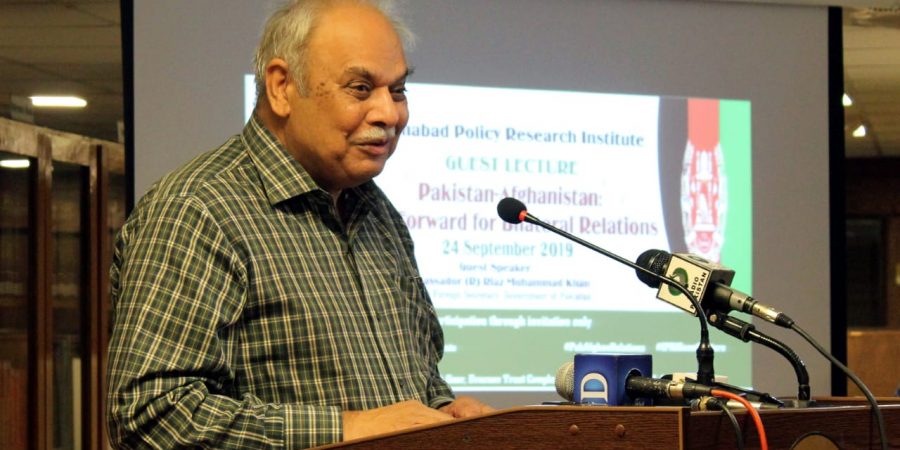Pakistan should not try to play sponsors or custodians of Taliban: expert

ISLAMABAD, SEPT 24 (DNA) -For Pakistan, it is better and safer to interact with Afghanistan on the basis of established state-to-state norms because this is a relationship from which we cannot insulate ourselves nor simply push aside.
There are few examples in the world where 50,000 people cross a border, unrecognized by one side, on a daily basis without any papers. This, in itself, and the people-to-people interactions make Pak-Afghan relations very close and intimate.
“However, there is also the relationship between Islamabad and Kabul; and here we need to be cautious not to make policy statements or give directions on Kabul’s behalf. Pakistan should not treat Afghanistan as its fifth province or liability. Let them work out their issues on their own. How the Afghans run their country, or want to, is their business. Not ours.”
These were the views of Ambassador (R) Riaz Mohammad Khan, Former Foreign Secretary, Government of Pakistan at the Guest Lecture on Pakistan-Afghanistan: Way Forward for Bilateral Relationsorganized by the Islamabad Policy Research Institute here in Islamabad today.
Ambassador Khan providing his insights from the time of the Soviet invasion of Afghanistan to signing of the Geneva Accord said that Soviet withdrawal did not prevent continuation of the conflict; the same is feared if the Americans leave Kabul precipitously.
“The current peace deal was tenuous to begin with since it was pushed by President Trump due to his re-election bid and past campaign promises. It had limited support from defence and diplomatic heavyweightsin Washington because negotiations without a ceasefire or reduction in conflict gave Taliban the upper hand.
Withdrawal without a plan of action to ensure that there is no civil war and the gains on the ground are not lostis unwise,” he said. Pakistan should also have a policy of having no favorites in terms of future Afghan governance even to contain the mischief of India who will have to go through Kabul and Washington, not the Taliban. “We will not target the Taliban or their families;and be candid and upfront on this approach with Washington and Kabul,” he advised.
He was of the view that the Afghan conflict is complex and Afghanistan is riven with deep schisms of a political, ethnic, sectarian and ideological character.
The hope that this 40-year old conflict has run its course depends on two trajectories: reduction in violence and some form of intra-Afghan dialogue for a political settlement. “Reduction of violence will depend on a formal or informal ceasefire which is inextricably linked to the question of a timeline for withdrawal and the compulsions of the current US President”he stressed.
The Ambassador observed that the leadership in Kabul needs to understand the miseries of their own people and think beyond the acrimonious past and work towards a coalition plan for peace in their country.
“The Taliban also need to be cognizant that while return to talks seems unlikely, especially before the Afghan elections, they would have to give more than they had conceded before, they would have reduce violence, if not complete ceasefire. They will have to scale down their positions,” he remarked.
On the role of Pakistan, he observed that the focus should be on looking at positive results rather than kudos for helping the process. Ambassador Khan lamented that “Pakistan’s four decades of involvement with the Afghan conflict has led to monumental losses. We missed out on opportunities offered by globalisation, ascendance of geo-economics and the opening up of Central Asia. Our aspirations for becoming a hub of economic activities for surrounding regions remained just a dream. Instead, we have been sucked into the vortex of extremist and religious violence and obscurantism ravaging the region especially the greater Middle East. Now we have pinned hopes on CPEC, but for realising the potential of that great enterprise, we need to rethink Afghanistan.”
Earlier,President IPRI Ambassador Vice Admiral (R) Khan Hasham bin Saddique,welcomed the esteemed speaker, diplomats, academicians and journalists in his inaugural address. He said that the situation in Afghanistan had become a sordid affair –evolving from infamous strategic depth to the current strategic mess, the pipelines of TAPI remain a pipe dream. “Despite hosting more than 2 million Afghan refugees for decades, the animosity that stems from Afghanistan is palpable. Peace in South Asia can only be realized through peace in Afghanistan. =DNA
============
Related News

KTC implements track and trace tax stamps, calls for measures to get rid of cigarettes smuggling
ISLAMABAD, MAY 3 (DNA): Khyber Tobacco Company (KTC) Limited becomes the first tobacco manufacturing companyRead More

Chairman Bilawal strongly condemns terror attack in Khuzdar, Balochistan
ISLAMABAD, MAY 1: /DNA/ – Chairman Pakistan Peoples Party, Bilawal Bhutto Zardari has strongly condemnedRead More


Comments are Closed